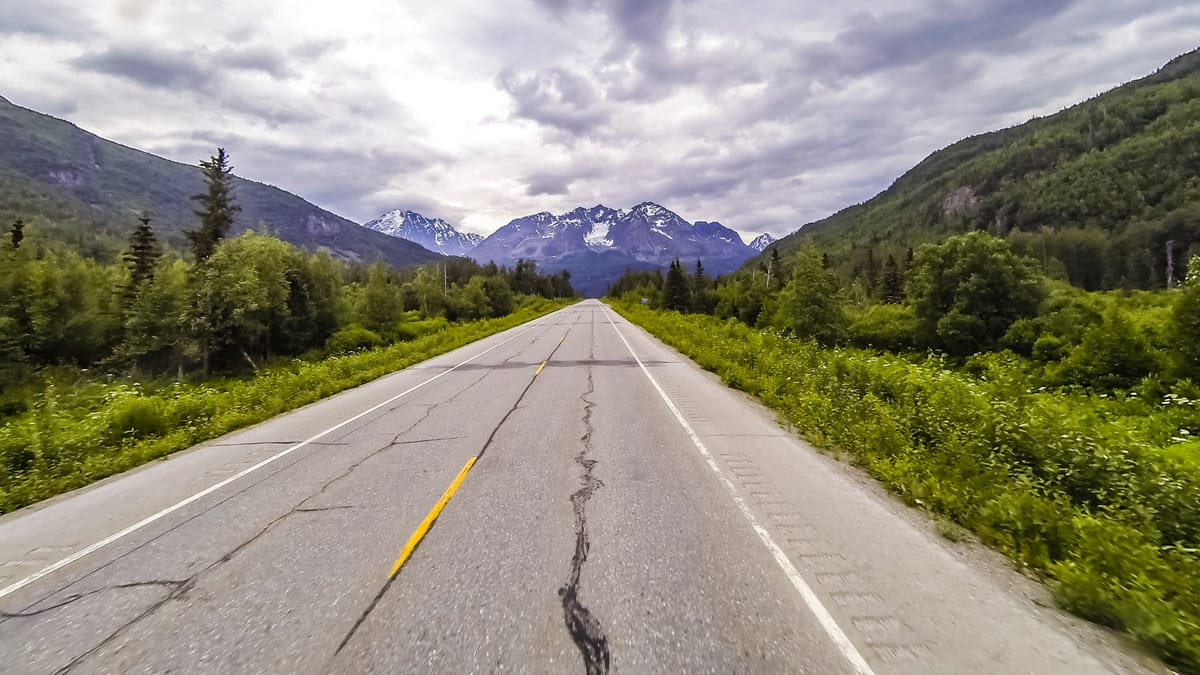Our Gas RV Experience – Noise, Ride & Performance

Last year we created a video and wrote an article putting a Gas RV in a head-to-head smackdown with a Diesel RV and it went over pretty well. But at that time we had never used, or lived in, a gas motorhome (we’d only test driven a gas coach) so we asked ourselves: how can we truly weigh in on the performance of a gas rv? Well…we couldn’t, until now that is.
Over the past 5 years we’ve had three different class A diesel motorhomes: 2 front engine and one rear engine from three different manufacturers: Thor, Monaco and Fleetwood. We feel like we’ve had a variety of experiences when it comes to small class A Diesel motorhomes.

What is it like to drive a Gas RV?
On our way to Valdez, AK we came down the Richardson Highway with it’s long hills and thought This is the perfect spot to setup the cameras and let people virtually hop into the RV with us as we leave town. There’s a little bit of everything here: Long inclines over Thompson Pass (100ft – 2800ft elevation), short rolling hills, beautiful views, Alaskan wildlife, bad roads, nearly perfect roads and so on. Without further ado, it’s time to hop in and buckle up.
Why we never considered a gas motorhome in the past.
It all boils down to one statement from one man whom we respect. Here’s a quick setup: Nikki’s uncle Mike is frugal, shoot I’d even call him downright cheap when it comes to certain things. Although he might argue and say he’s smart with his money…so insert your favorite ‘thrifty’ term and you get what I’m saying. Nikki’s aunt and uncle were the first people in the family to buy a motorhome and invite us to see it. Mike was so proud of his new motorhome and boasted gleefully what a bang-up deal he got on this brand new Ford V-10 gas powered RV. (This is where we decided we liked the idea of RVing)
Not more than a month later we saw Mike again and he said this one (paraphrased) line: I drove it to Colorado through the Rocky Mountains and I just about pissed my pants chugging up the mountain at 20mph while giant semi-trucks flew by us on the left. Ya see, he drove that under-powered gas RV to Colorado, turned around and drove straight back to the dealership in Texas, happily bent over and said I need a more powerful RV, this piece of junk just ain’t gonna cut it. I am paraphrasing here again but you get the jest of it: Mr. Frugal took a huge financial hit by switching RVs, but he said it was worth every penny to upgrade to diesel. Now 6 years later he still has that same diesel RV and loves it.
I like to learn from others mistakes, especially when it saves me money, so from that day forward we never even considered a gas RV.
My first Gas RV experience was in our House Hunters Episode where I didn’t leave the RV lot and my second experience was driving around the block for the Gas vs Diesel Smackdown.
What’s the verdict on a Gas RV vs. Diesel RV Smackdown?
Now that we’re testing out the new Bounder everything has changed! Since we picked this coach up in May 2015, we’ve thrown ourselves into the Gas RV world head first and we’ve taken this beast on the most epic of RV road trips: ALASKA. Nothing like trial by fire, right?
I’ve decided to create this post and update it based on our experiences in our first gas motorhome. (you can learn why we are in this coach here) I don’t know how often I’ll update it but when I have an experience worth sharing it’ll end up here. If you want to keep in the loop make sure to subscribe and we’ll shoot an email when changes are made.
I won’t be talking about creature comforts or features here (cause those change drastically based on the manufacturer), just the ups and downs of the chassis side of our RV. One thing I do know: At the end of this big trip, and at the end of our test period, I’ll have some very strong thoughts on the good and bad of buying a Gas RV.
The Good and Bad of a Gas RV
The Good
- $40,000 less expensive than a comparable diesel
- Gas at Costco, Sams Club, Grocery stores, etc seems to be much cheaper than the standard gasoline stores, these places don’t always have diesel, so pulling into Costco and paying for the cheapest gas in town is a really rewarding feeling!
- Wind noise and rattle seem to be on par with our diesel RVs
- At a cruising speed of 55-60 mph the RV handles well on flat highways with new roads
- The ride isn’t any worse than a diesel without air suspension, for example our first RV the Damon Avanti
The Bad
- Based on the instrument cluster and steering wheel from 1990 it seems Ford doesn’t give a crap about the RV industry. The trip computer is worthless as it only provides an estimated ‘Distance to Empty’ but gives me no info on MPG, temperatures, gear selection or any of the other info I’ve grown accustomed to.
- The 5 speed transmission needs a major overhaul and new gear ratios with a 6th and/or 7th gear. (we’ve recently heard there’s a new transmission in testing)
- Cruise Control is a total joke – Even the slightest incline causes the transmission to drop down to 3rd and sometimes 2nd gear which destroys any fuel economy and worse makes the engine scream at the people inside the coach.
- Climbing Hills and small mountains is louder than our front engine diesel RVs, and a lot louder than our rear engine Excursion. My climbing speeds are slower than in a diesel but not by much. I’ll be interested to see how it handles the Rocky Mountains as we cross into Canada later this month.
- Fuel Economy and Tank size – We are stopping every 500 miles to fill up vs. every 900 miles in a diesel. It’s not a huge deal, but I find myself with fuel on the mind way more often than I’m used to. I’m tracking my MPGs and will share in my next update once I have more fill-ups.
- The doghouse (engine cover) does get warm when driving but when it’s chilly outside so it’s no biggie. (Fleetwood has just launched a new insulation package based on our input)
- The doghouse is a pain in the butt to maneuver around when getting into the front seats. We also put the litter box up front and it’s a pain to clean the litter box around the engine cover.
- The brake pedal location is a little in front of the gas pedal so stopping requires me to pick my foot up off the gas and apply it to the brake pedal, vs. our other RVs it’s been a simple side-to-side motion saving me from picking up my foot and thus allowing me to apply the brakes more quickly.
- Body roll is worse than a diesel and we get blown around a little by big gusts of wind, semi-trucks passing or uneven roads. It’s not horrible, it’s just more noticeable.
- Stopping distance seems much longer than our diesel coaches with air brakes.
- No Headlight warning when I remove the key and accidentally leave on the headlights. There is no “auto on” lights or daytime running lights either.
- No recirculate button on the HVAC controls which is bad for dusty roads.
- Furnace – There is only one propane furnace (vs. 2 in the Excursion) so we seem to burn through propane a lot faster in the Bounder, like 3 times faster!
- Weight – We are maxed out on our GVWR but since our Smart car only weighs 2,000 lbs. we come in under the GCVWR. This is a personal issue and we are doing our best to get rid of stuff.
- Oil Changes – Oil changes are less expensive however we are required to do them every 5,000 miles vs. every 15,000 miles in a diesel.
- Generator – The Generator is much louder than our Diesels have been, even though its still an Onan Quiet series it makes a lot of noise when it’s under a load. On top of that the pitch seems to be much higher so the noise seems to carry further distances so I’m almost embarrassed to use it when there’s campers nearby. Finally the location in the bedroom is annoying, if we need to run the generator it’s nearly impossible to do anything in the bedroom while it’s running.
- Little features – There are several little items that I never noticed until living in a Gas RV. The $40k discount comes from many unnoticed features such as a ‘single line inverter’, lower end furniture material, less comfortable captains chairs, knock off faucet, no hydraulic arm on entry door and so on. These are all little things we can live with, my point is it’s not just the engine and chassis that make up the $40k discounted price.
With the price being so much cheaper I can see why people on a budget would consider a gas coach, heck for 40 grand you can travel to a lot of places! Based on our experience so far I’m thinking this gas coach thing isn’t so bad and I could totally get used to it. That said if we were to purchase today we’d most likely put our money into a diesel motorhome.
The Curve Ball
Over the past couple months we’ve had multiple chat sessions with people that are debating on Gas or Diesel for their new RV and there’s always one “curve ball” they throw in at the end:
What if my total budget is $150,000 and I can’t spare another cent on the purchase price?
I typically respond with this exact answer:
It’s not about which RV is better, it’s a question of how you wish to camp with your new Motorhome.
- If you want to drive a lot of miles (like 10,000+ per year) and stay exclusively at an RV park so you can plug in, go for the entry level diesel which will cost you right around that $150k mark.
- If you want to drive shorter distances and wild camp as much as possible then special order your gas RV with the Technology and Modifications that we’ve done with our coach.
Now It’s Your Turn
My goal with this article is to be totally open here by sharing our experiences and honest thoughts of driving and living with a gas powered RV. We hope through sharing honest opinions other future RVers can more simply make the call when it comes to buying a Gas or Diesel RV. We’re not saying our way is the best, or our opinions are the only ones out there, it’s just the best way we know to get the conversation started.
What’s your take on the whole gas vs diesel debate? We’d love to hear any thoughts from fellow past and present gas RV and diesel RV owners.
Disclaimer – We do not own this bounder, it is a test coach. You can learn more about why we are in this coach here: Resurrecting Dinosaurs – The Story Behind Our RV Design




